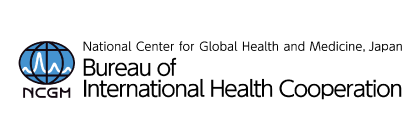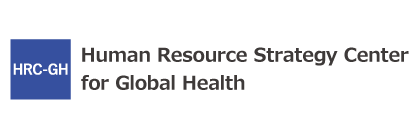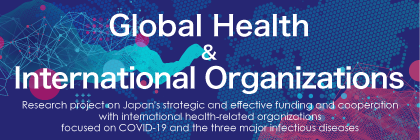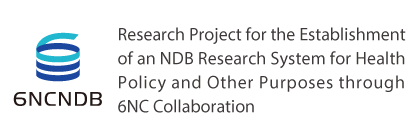TOP > Research Projects
Research Projects
At the Institute for Global Health Policy Research (iGHP), our cross-disciplinary team aims to address major global health challenges from diverse fields and to advance evidence for global health policy and sustainable healthcare system. The iGHP is also committed to training the next generation of global health leaders and researchers.
Global Health Diplomacy and Governance Research
Research to establish strategic and effective intervention methods to increase effective intervention at international conferences
Summary
The purpose of this project is to develop methods and establish effective educational programs for Japan to strategically intervene in international discussions and advocate Japan's position, based on an analysis of the history of today's issues in global health and the trends of Japan and other governments, focusing on major meetings and general assemblies of the World Health Organization.
Specifically, the project will empirically analyze areas where Japan's intervention is effective (strengths) and areas where it is difficult to intervene (weaknesses), compare Japan's approach with that of other countries. Based on the results, we will conduct case studies on topics that will inevitably cause arguments among country representatives at the WHO conference, and develop methods for effectively representing Japan's position. In addition, we will collect and analyze information on trends in policy research institutes on global health diplomacy in other countries and their training programs, and develop educational materials for training programs on global health diplomacy to develop human resources in international health.
Related links
Program on global health affairs and governance
Summary
In the program on global health affairs and governance, we conduct research on international cooperation and the governance mechanisms for global heath in order to achieve the Goal 3 of the Sustainable Development Goals (SDGs) by 2030, contributing to the realization of people's "right to health”. In 2021, we participated in three research projects.
- Participation in the Executive Committee on "Global Health and Human Security"
The Executive Committee was established in 2007, through the process of formulating policy recommendations for the G7 Hokkaido-Toyako Summit. The executive committee aims to help Japan formulate global health policy, and to promote public-private partnerships in global health. Through information sharing, exchange of opinions, and promotion of policy proposals, the committee explores Japan’s engagement in global health affairs, taking a whole-of-society approach. Recently, the committee discussed policy recommendations for the 2016 G7 Ise-Shima Summit and the 2019 G20 Osaka Summit. Currently, the committee promotes policy dialogues towards the year 2023 when Japan hosts the G7 Summit.
The detail is following: https://www.jcie.org/programs/global-health-and-human-security/executive-committee-on-global-health-and-human-security/ - Participation in the "Comprehensive research on proposed ideas for WHO monitoring and reform and on Japan’s strategic and effective intervention”.
Following up on the ideas proposed by the member states to monitor and reform the World Health Organization (WHO), we summarize issues that may be put on the agenda of the World Health Assembly. Then, we formulate policy options, and share ideas about strategic and effective proposals with the Ministry of Health, Labor, and Welfare. We also critically evaluate the position of the WHO in the global health landscape and governance. - Participation in the Global Health Governance Study Group "The International Order and Japan’s Role in the COVID and Post-COVID Era" (Secretariat: Japan Center for International Exchange) as deputy chairperson
While exchanging opinions with the Ministry of Foreign Affairs, we conduct research on emerging issues related to the pandemic of COVID-19, including the relationship between access to medicines and intellectual property rights, and global governance over infectious diseases outbreaks on international cruise ships.
The detail is following: https://www.jcie.org/programs/global-health-and-human-security/gh-governance-study-group/
Research project on Japan’s strategic and effective funding and cooperation with international health-related organizations focused on COVID-19 and the three major infectious diseases
Summary
As a member of the international community, Japan has consistently aimed to contribute to the achievement of the Sustainable Development Goals (SDGs). Thus, in this project, we aim to study the country’s strategic and effective involvement in the field of global health, focused on the eradication of infectious diseases, including COVID-19 and the three major infectious diseases (HIV/AIDS, tuberculosis, and malaria).
Specifically, we aim to achieve the following objectives:
- Analyze the strategies and activities of international organizations, such as the Global Fund and the World Health Organization, and make recommendations on the Japanese government’s response to the governance meetings of these organizations;
- Analyze the current situation and present proposals on how Japan can effectively and strategically contribute to and cooperate with international organizations and groups focused on infectious diseases; and
- Study how Japan can become more involved in promoting the international deployment of Japanese products and technologies.
Related link
Global Health Policy Research
Supporting evidence-based policymaking through the utilization of medical big data: A collaborative research with the government of Thailand, Thailand’s National Health Security Office (NHSO), Prince of Songkla University, and the Japan International Cooperation Agency (JICA)
Summary
This Japan-Thai collaborative research was established based on a project by the Japan International Cooperation Agency (JICA), which aims to contribute to an evidence-based policymaking using the medical big data in Thailand. The Institute for Global Health Policy Research (iGHP) is conducting research on major non-communicable diseases and health financing utilizing the medical big data that contains around 47 million Thai people, which constitutes 70% of the entire population of Thailand for 8 years, while establishing a foundation for research and promoting capacity building of young researchers in collaboration with Thailand’s National Health Security Office (NHSO).
Research and development of data platforms to support the health of refugees and immigrants
Summary
In collaboration with the United Nations Relief and Works Agency for Palestine Refugees in the Near East (UNRWA), we are working to create a system that allows each refugee to monitor his or her own health status and promote voluntary health management using applications and other tools. We are also conducting epidemiological studies on diabetes, hypertension, dyslipidemia, and other non-communicable diseases that are major burden of diseases in UNRWA, including the impact of COVID-19. This research aims to contribute to the understanding of NCD high-risk individuals, the setting of priority for health care activities, priority interventions, and policy recommendations by aggregating the prevalence, treatment rate, control rate, and prognosis of NCDs by sex, age, and district, selecting outcome indicators for each project, and forming and evaluating the PDCA cycle.
Related link
Global comparison of children’s mental health and associated factors
Summary
Mental health during childhood and adolescence has a long-lasting impact on health and wellbeing and its promotion is of global importance. Studies have clarified that mental health and mental illness in childhood and adolescence are largely influenced by the social environment in which they live.
In this study, we work with researchers in Japan and UK to compare prevalence, risk and protective factors for children's mental health problems at the global level. We also aim to understand its cultural difference. Through these research, we aim to improve our understanding of the etiology of children's mental health and to offer evidence for preventive measures that take account of country-specific factors.
Public Health Policy Research using Big Data
Research on the longitudinal impact of COVID-19 on health and well-being
Summary
The global pandemic of Coronavirus Disease 2019 (COVID-19) continues to spread worldwide, and is causing considerable impact on the health and wellbeing of the people. In addition, recent evidence showed that many patients who have had COVID-19 infection may show persistent symptoms after the recovery from the acute symptoms, known as post-COVID-19 condition.
In this study, NCGM in collaboration with Kyoto University, Osaka University, and Tsukuba University investigates the long-term consequences of the COVID-19 pandemic on the health and healthcare of Japanese people using data from nationwide database. Furthermore, we will conduct follow-up studies of COVID-19 patients after hospital discharge to describe the time course of post-COVID-19 conditions and socioeconomic and psychological factors.
Research project for the establishment of an NDB research system for health policy and other purposes through 6NC collaboration
Summary
Researchers at six National Centers (NCs) are collaborating to generate evidence on important diseases that NCs are responsible for using anonymous receipt information and anonymous specific health checkup information databases (National Database, NDB), and to provide basic information for policy research and recommendations. We aim to contribute to Evidence-based Policy Making (EBPM) and policy evaluation. In addition, for the future development of database research, we will compile important information for conducting research (disease definitions, etc.) and provide the information in a form that can be used not only by NCs but also by other research institutions. We also make capacity building of researchers who will contribute to medical policy research using the NDB in the future.
Related link
Understanding the role of adolescent socioemotional development on later NCDs using a life course approach: evidence from a population-based cohort in Japan
Summary
Adolescence is a period when children face large biological, psychological and social change. It has been suggested that mental health during this period is important for lifelong health of the child and may also influence the health of future generations. This study focuses on the mental health during adolescence to examine associated factors and how it relates with non-communicable diseases in adulthood.
Evaluate the Impact of the designated cancer care hospital policy on the equalization of medical care
Summary
Designated cancer care hospitals (DCCHs) aim to ensure that all citizens can receive standard cancer care regardless of where they live, in other words, "equalization of cancer care”. Although a disparity in treatment functions among the DCCHs may exist, its current situation remains unclear. This study, in collaboration with the Osaka International Cancer Center, evaluates the DCCH policy based on the perspective of equalization and disparity in cancer care using population-based cancer registry.
Related link
The trend and impact of new tobacco products over the life course
Summary
In Japan, the number of new cigarette users (e.g., heated tobacco, e-cigarettes) is increasing rapidly. This study, in collaboration with the Osaka International Cancer Institute, conducts internet surveys of the general population and pregnant and peripartum women to examine (1) the use of new tobacco products over the life course, (2) the associations between use of new tobacco products and health behaviors, and (3) the impact of these products on smoking cessation.
Secondhand smoke and the risk of incident ischemic heart disease and stroke among never-smoking women; The factors that promote or inhibit secondhand smoke avoidance behavior
Summary
According to the World Health Organization, Japan's measures against secondhand smoking lag behind those of other countries. It is estimated that 15,000 people die annually in Japan due to secondhand smoking, and about 80% of these deaths are due to cardiovascular diseases. In addition, about 600,000 people die annually in the world from secondhand smoking. Secondhand smoking is a more serious problem in the Asian region, but until now, the results of a large-scale cohort study in Japan on secondhand smoking and the incidence of cardiovascular diseases have not been reported. This study is the first study in Asia that uses data from the Japan Public Health Center-based Prospective Study (JPHC study) in collaboration with the National Cancer Center and enable us to compare the results with those of previous studies in Europe and the United States. In addition, we are investigating secondhand smoking avoidance behavior through a survey on secondhand smoking among university students in Japan.
Related link
Research on building a model to promote behavior change through the utilization of Personal Health Record
Summary
Personal Health Record (PHR) refers to a system in which individuals use and manage information related to their health, medical care, and caregiving. The goal is for each individual to use their PHR to improve their own health. Currently, the Ministry of Health, Labour, and Welfare (MHLW) is leading a PHR service that provides information on health checkups to individuals through My Number Portal, and a variety of PHR services are being developed by the private sector. This study provides an overview of PHR services in Japan and examines factors related to PHR services use, as well as their associations with health outcomes.
Research on Disease Prevention in Low- and Middle-income Countries and Vulnerable Population
Serosurvey of vaccine-preventable infectious diseases
Summary
Asia is a region with high prevalence of hepatitis B. To prevent mother-to-child transmission of hepatitis B, which is the main route of infection, a universal immunization program for infants has been promoted. Whether the prevalence has decreased in a community should be evaluated by comparing the seroprevalence of hepatitis B virus surface antigen between the pre- and post-intervention generations. This study is conducted in collaboration with the Bureau of International Health Cooperation, aiming at comparing the test results and costs of the serosurvey of hepatitis B virus surface antigen between the use of rapid diagnostic test kit and dried blood spots-based electrochemiluminescence immunoassay, using the data from 2072 participants aged 1-39 years in south-central Vietnam.
Quality improvement for comprehensive cervical cancer services through women's health promotion
Summary
In WHO's Western Pacific Region, about 90% of cervical cancer cases are concentrated in middle-income countries. The global strategy to eliminate cervical cancer is to provide human papillomavirus vaccine, cervical cancer screening and treatment to 90%, 70% and 90% of the target population, respectively. However, the current coverages of these interventions remain low. This study is conducted in collaboration with the Bureau of International Health Cooperation, to review the status of HPV vaccine implementation and national plans in middle-income countries in the Western Pacific region.
Infection control teams for reducing healthcare-associated infections in hospitals and other healthcare settings: a systematic review
Summary
Healthcare-associated infection is a global challenge. Infection control has been carried out by infection control teams that is comprised of multiple medical professionals. The infection control link nurse system has also been introduced in 1980s’. This study is conducted in collaboration with the Bureau of International Health Cooperation, to review the effectiveness of infection control teams and link nurse systems on reducing healthcare setting infections.
Related link
Prevention of mother-to-child transmission of HIV in Zambia: a cohort study
Summary
In the Republic of Zambia located in Southern Africa, an estimated 11% of adult population is living with HIV. HIV can be transmitted from mother to child during pregnancy and throughout lactation period. Although the prevention of mother-to-child transmission program has been implemented in the country, limited studies have shown its impacts and challenges. This study is conducted in collaboration with the Bureau of International Health Cooperation, to assess retention-in-care and mother-to-child transmission by tracing a cohort of HIV-infected pregnant women in Chongwe District from pregnancy to six months postpartum.






